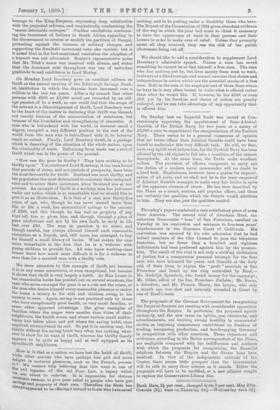We draw attention to this example of thrift, not because
it is in any sense miraculous, or even exceptional, but because it shows that thrift is very largely a habit. As Miss Loane in her remarkable books has pointed out on several occasions, the man who eaves amongst the poor is as a rule not the miser, or the man who denies himself every reasonable pleasure or makes his home a misery to his wife and children owing to his anxiety to save. Again, saving is not practised only by those who have exceptionally good health, or very small families, or some other apparent advantage. She gives examples of families where the wages were smaller than those of their neighbours, the health worse, and where various small misfor- tanes had taken place, and yet where the saving habit, once acquired, accomplished its end. To put it in another way, the family without the saving habit very often has nothing what- ever to show for its want of thrift, whereas the thrifty family aPPears to be quite as happy and as well equipped as its spendthrift neighbours.












































 Previous page
Previous page